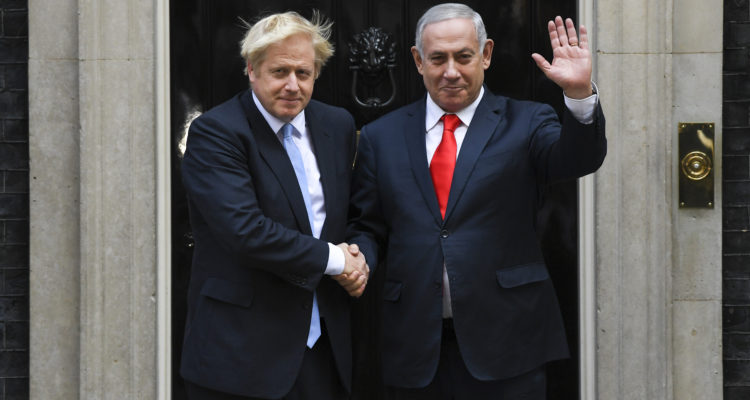The Israeli prime minister met with his British counterpart on Thursday to discuss the Iranian threat, regional conflict and the spike in anti-Semitism in the United Kingdom.
By World Israel News Staff
On Thursday, Israeli Prime Minister Benjamin Netanyahu held what has been described as a “snap meeting” with the United Kingdom’s Boris Johnson, spending around thirty minutes at 10 Downing Street during a whirlwind visit in the run-up to Israeli elections in two weeks.
While the mood during a press conference at the beginning of the meeting was generally friendly, Netanyahu commented, “I’d like to talk to you about that” when Johnson stressed the U.K.’s support for a “two-state solution,” a reference to the Palestinians’ nationalistic ambitions.
Netanyahu offered his response after Johnson stated, “The UK still supports all efforts to reach a solution to the Middle East peace process,” emphasizing that he meant “a two-state solution.”
The majority of Israelis do not support Palestinian statehood, with 42 percent of Israeli respondents in a 2019 Tel Aviv University poll expressing support for Israeli annexation of Judea and Samaria, a position Netanyahu has advocated on multiple occasions.
Support for the two-state solution has plummeted among Israelis during the quarter century since the Oslo accords were signed, which purported to forge a path to peace between the Israelis and Palestinians.
Despite massive concessions to the Palestinians, including complete disengagement from Gaza, the Hamas terror group controls large swaths of Palestinian society and advocates wiping out the Jewish state. Meanwhile, Mahmoud Abbas’ Palestinian Authority (P.A.) has refused to negotiate with Israel regarding the primary points of contention in the dispute.
Both Hamas and the P.A. financially support terrorism, including paying lifetime salaries to the murderers of Israeli civilians, and require school curricula that promote anti-Semitism and blatant falsehoods that distort history.
Prior to the exchange about the “two-state solution,” Netanyahu expressed Israel’s gratitude to Johnson, commenting, “You have been a great friend of the Jewish people and Israel. I applaud your staunch stance against anti-Semitism and your support for Israel’s security.”
Netanyahu also raised the issue of Iran’s belligerence, adding, “It’s not that we lack challenges. We have the challenge of Iran’s aggression and terrorism, and I’d like to talk to you about how we can work together to counter these things for the benefit of peace.”
In total, the meeting lasted only half an hour, which some chalked up to the challenges Johnson faces related to the U.K.’s exit from the European Union, which has generated strong opinions on both sides of the debate.
Netanyahu was also slated to meet with U.K. Secretary of State for Defense Ben Wallace and U.S. Secretary of Defense Mark Esper, who is visiting London, “to discuss matters of national security,” said the Israeli Embassy in London.
The prime minister was accompanied on his trip to London by Israel Air Force chief Major General Amikam Norkin and IDF Head of Operations Directorate Major General Aharon Haliva.




